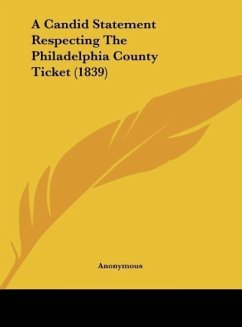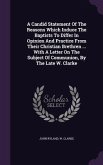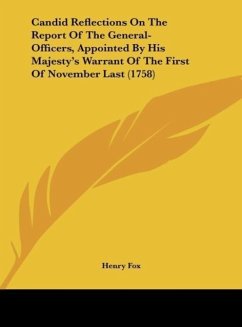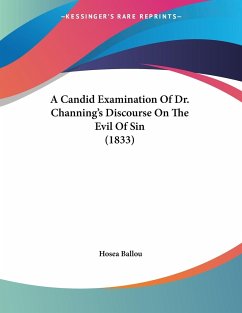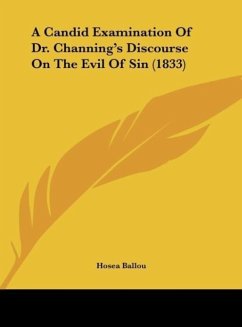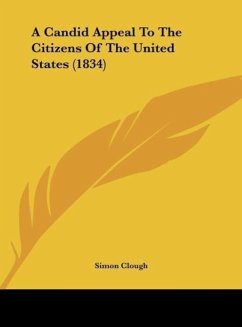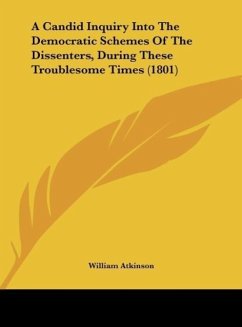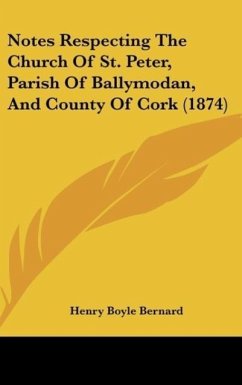Anonymous
A Candid Statement Respecting The Philadelphia County Ticket (1839)
Anonymous
A Candid Statement Respecting The Philadelphia County Ticket (1839)
- Gebundenes Buch
- Merkliste
- Auf die Merkliste
- Bewerten Bewerten
- Teilen
- Produkt teilen
- Produkterinnerung
- Produkterinnerung
This book is a facsimile reprint and may contain imperfections such as marks, notations, marginalia and flawed pages.
Andere Kunden interessierten sich auch für
![A Candid Statement Of The Reasons Which Induce The Baptists To Differ In Opinion And Practice From Their Christian Brethren ... With A Letter On The Subject Of Communion, By The Late W. Clarke A Candid Statement Of The Reasons Which Induce The Baptists To Differ In Opinion And Practice From Their Christian Brethren ... With A Letter On The Subject Of Communion, By The Late W. Clarke]() John RylandA Candid Statement Of The Reasons Which Induce The Baptists To Differ In Opinion And Practice From Their Christian Brethren ... With A Letter On The Subject Of Communion, By The Late W. Clarke28,99 €
John RylandA Candid Statement Of The Reasons Which Induce The Baptists To Differ In Opinion And Practice From Their Christian Brethren ... With A Letter On The Subject Of Communion, By The Late W. Clarke28,99 €![Candid Reflections On The Report Of The General-Officers, Appointed By His Majesty's Warrant Of The First Of November Last (1758) Candid Reflections On The Report Of The General-Officers, Appointed By His Majesty's Warrant Of The First Of November Last (1758)]() Henry FoxCandid Reflections On The Report Of The General-Officers, Appointed By His Majesty's Warrant Of The First Of November Last (1758)24,99 €
Henry FoxCandid Reflections On The Report Of The General-Officers, Appointed By His Majesty's Warrant Of The First Of November Last (1758)24,99 €![A Candid Examination Of Dr. Channing's Discourse On The Evil Of Sin (1833) A Candid Examination Of Dr. Channing's Discourse On The Evil Of Sin (1833)]() Hosea BallouA Candid Examination Of Dr. Channing's Discourse On The Evil Of Sin (1833)19,99 €
Hosea BallouA Candid Examination Of Dr. Channing's Discourse On The Evil Of Sin (1833)19,99 €![A Candid Examination Of Dr. Channing's Discourse On The Evil Of Sin (1833) A Candid Examination Of Dr. Channing's Discourse On The Evil Of Sin (1833)]() Hosea BallouA Candid Examination Of Dr. Channing's Discourse On The Evil Of Sin (1833)24,99 €
Hosea BallouA Candid Examination Of Dr. Channing's Discourse On The Evil Of Sin (1833)24,99 €![A Candid Appeal To The Citizens Of The United States (1834) A Candid Appeal To The Citizens Of The United States (1834)]() Simon CloughA Candid Appeal To The Citizens Of The United States (1834)25,99 €
Simon CloughA Candid Appeal To The Citizens Of The United States (1834)25,99 €![A Candid Inquiry Into The Democratic Schemes Of The Dissenters, During These Troublesome Times (1801) A Candid Inquiry Into The Democratic Schemes Of The Dissenters, During These Troublesome Times (1801)]() William AtkinsonA Candid Inquiry Into The Democratic Schemes Of The Dissenters, During These Troublesome Times (1801)25,99 €
William AtkinsonA Candid Inquiry Into The Democratic Schemes Of The Dissenters, During These Troublesome Times (1801)25,99 €![Notes Respecting The Church Of St. Peter, Parish Of Ballymodan, And County Of Cork (1874) Notes Respecting The Church Of St. Peter, Parish Of Ballymodan, And County Of Cork (1874)]() Henry Boyle BernardNotes Respecting The Church Of St. Peter, Parish Of Ballymodan, And County Of Cork (1874)25,99 €
Henry Boyle BernardNotes Respecting The Church Of St. Peter, Parish Of Ballymodan, And County Of Cork (1874)25,99 €-
-
-
This book is a facsimile reprint and may contain imperfections such as marks, notations, marginalia and flawed pages.
Produktdetails
- Produktdetails
- Verlag: Kessinger Publishing, LLC
- Seitenzahl: 36
- Erscheinungstermin: 23. Mai 2010
- Englisch
- Abmessung: 286mm x 221mm x 7mm
- Gewicht: 379g
- ISBN-13: 9781162068275
- ISBN-10: 1162068272
- Artikelnr.: 30938958
- Herstellerkennzeichnung
- Libri GmbH
- Europaallee 1
- 36244 Bad Hersfeld
- gpsr@libri.de
- Verlag: Kessinger Publishing, LLC
- Seitenzahl: 36
- Erscheinungstermin: 23. Mai 2010
- Englisch
- Abmessung: 286mm x 221mm x 7mm
- Gewicht: 379g
- ISBN-13: 9781162068275
- ISBN-10: 1162068272
- Artikelnr.: 30938958
- Herstellerkennzeichnung
- Libri GmbH
- Europaallee 1
- 36244 Bad Hersfeld
- gpsr@libri.de
Vyasa (c. 200 BC) is the legendary author of the Mahabharata, Vedas and Puranas, some of the most important works in the Hindu tradition. Vyasa appears for the first time as the compiler of, and an important character in, the Mahabharata. It is said that he was the expansion of the God Vishnu, who came in Dwaparayuga to make all the Vedic knowledge from oral tradition available in written form. He was the son of Satyavati, adopted daughter of the fisherman Dusharaj and the wandering sage Parashara, who is credited with being the author of the first Purana, Vishnu Purana. He was born on an island in the river Yamuna. Due to his dark complexion, Vyasa was also given the name Krishna, in addition to the name Dwaipayana, meaning "island-born." According to the Mahabharata, the sage Vyasa was the son of Satyavati and Parashara. During her youth, Satyavati was a fisherwoman who used to drive a boat. One day, sage Parashara was in a hurry to attend a Yajna. Satyavati helped him cross the river borders. On this account, the sage offered her a mantra which would result in begetting a son who would be a sage with wisdom and all good qualities. Satyavati immediately recited the mantra and thus Vyasa was born. She kept this incident a secret, not telling even King Shantanu. The festival of Guru Purnima is dedicated to Vyasa. It is also known as Vyasa Purnima, for it is the day believed to be both his birthday and the day he divided the Vedas. Vyasa is also considered to be one of the seven Chiranjivins (long-lived, or immortals), who are still in existence according to Hindu tradition.

